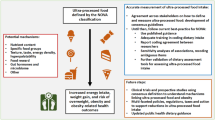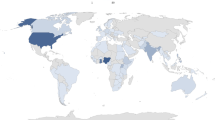Abstract
We evaluated the acceptability and use of macronutrient supplementation among HIV-infected pregnant Ugandan women receiving antiretroviral therapy in a clinical study (NCT 00993031). We first conducted formative research among 56 pregnant and lactating women to select a supplement regimen. Acceptability and use of the supplementation regimen (35 sachets of lipid-based nutrient supplements (LNS) and 4 or 6 kg of instant soy porridge for the household provided monthly) were evaluated among 87 pregnant women. Organoleptic assessments of LNS were favorable. Participants reported consuming LNS a mean of 6.1 days per week, and adherence to recommended consumption behaviors (e.g. frequency, quantity, not sharing) was >80 %. Few women reported negative social consequences of supplementation. The majority of participants also consumed most of the porridge intended for the household. In sum, LNS was acceptable and used regularly. Larger studies to evaluate physical and psychosocial consequences of LNS during pregnancy among HIV-infected women are warranted.
Similar content being viewed by others
References
Papathakis PC, Rollins N. HIV and nutrition: pregnant and lactating women. World Health Organization: consultation on nutrition and HIV/AIDS in Africa: evidence, lessons, and recommendations for action Durban, South Africa. 2005. p. 1–42.
Kosmiski L. Energy expenditure in HIV infection. Am J Clin Nutr. 2011;94:1677S–82S.
Food and Agricultural Organization. Human energy requirements: report of a joint FAO/WHO/UNU expert consultation. Rome. 2001;17–24:2004.
Committee on Nutritional Status During Pregnancy and Lactation. Institute of Medicine. Nutrition During Pregnancy. Washington: National Academy Press; 1990.
Raiten DJ, Mulligan K, Papathakis P, Wanke C. Executive summary—nutritional care of HIV-infected adolescents and adults, including pregnant and lactating women: what do we know, what can we do, and where do we go from here? Am J Clin Nutr. 2011;94:1667S–76S.
Baum MK, Campa A, Lai S, Sales Martinez S, Tsalaile L, Burns P, et al. Effect of micronutrient supplementation on disease progression in asymptomatic, antiretroviral-naive, HIV-infected adults in Botswana: a randomized clinical trial. JAMA. 2013;310:2154–63.
Banda Y, Chapman V, Goldenberg RL, Chi BH, Vermund SH, Stringer JSA. Influence of body mass index on pregnancy outcomes among HIV-infected and HIV-uninfected Zambian women. Trop Med Int Health. 2007;12:856–61.
Ekouevi DK, Coffie PA, Becquet R, Tonwe-Gold B, Horo A, Thiebaut R, et al. Antiretroviral therapy in pregnant women with advanced HIV disease and pregnancy outcomes in Abidjan. Côte d’Ivoire. AIDS. 2008;22:1815–20.
Villamor E, Dreyfuss ML, Baylín A, Msamanga G, Fawzi WW. Weight loss during pregnancy is associated with adverse pregnancy outcomes among HIV-1 infected women. J Nutr. 2004;134:1424–31.
Castetbon K, Ladner J, Leroy V, Chauliac M, Karita E, De Clercq A, et al. Low birthweight in infants born to African HIV-infected women: relationship with maternal body weight during pregnancy: pregnancy and HIV Study Group (EGE). J Trop Pediatr. 1999;45:152–7.
Young S, Murray K, Mwesigwa J, Natureeba P, Osterbauer B, Achan J, et al. Maternal nutritional status predicts adverse birth outcomes among HIV-infected rural Ugandan women receiving combination antiretroviral therapy. PLoS One. 2012;7:e41934.
Kramer MS. Determinants of low birth weight: methodological assessment and meta-analysis. Bull World Health Organ. 1987;65:663–737.
Kelly A, Kevany J, de Onis M, Shah PM. A WHO collaborative study of maternal anthropometry and pregnancy outcomes. Int J Gynaecol Obstet. 1996;53:219–33.
Viswanathan M, Siega-Riz AM, Moos MK, Deierlein A, Mumford S, Knaack J, et al. Outcomes of maternal weight gain. Evidence report/technology assessment. Rockville: Agency for Healthcare Research and Quality; 2008. p. 1–223.
Siegfried N, Irlam JH, Visser ME, Rollins NN. Micronutrient supplementation in pregnant women with HIV infection. Cochrane Database Syst Rev. 2012;3:CD009755.
Bhutta ZA, Das JK, Rizvi A, Gaffey MF, Walker N, Horton S, et al. Evidence-based interventions for improvement of maternal and child nutrition: what can be done and at what cost? Lancet. 2013;382:452–77.
Adu-Afarwuah S, Lartey A, Zeilani M, Dewey KG. Acceptability of lipid-based nutrient supplements (LNS) among Ghanaian infants and pregnant or lactating women. Matern Child Nutr. 2011;7:344–56.
Young SL, Blanco I, Pelto GH, Neufeld LM. Organoleptic properties, ease of use, and perceived health effects are determinants of acceptability of micronutrient supplements among poor Mexican women. J Nutr. 2010;140:605–11.
Aguayo V, Kone D, Bamba S, Diallo B, Sidibe Y, Traore D, et al. Acceptability of multiple micronutrient supplements by pregnant and lactating women in Mali. Public Health Nutr. 2005;8:33–7.
Seck B, Jackson R. Determinants of compliance with iron supplementation among pregnant women in Senegal. Public Health Nutr. 2007;3:1–10.
Galloway R, Dusch E, Elder L, Achadi E, Grajeda R, Hurtado E, et al. Women’s perceptions of iron deficiency and anemia prevention and control in eight developing countries. Soc Sci Med. 2002;55:529–44.
Nagata JM, Cohen CR, Young S, Wamuyu C, Armes MN, Otieno BO, et al. Descriptive characteristics and health outcomes of the food by prescription nutrition supplementation program for adults living with HIV in Nyanza Province, Kenya. PLoS One. 2014;9:e91403.
Rawat R, Kadiyala S, McNamara PE. The impact of food assistance on weight gain and disease progression among HIV-infected individuals accessing AIDS care and treatment services in Uganda. BMC Public Health. 2010;10:316.
Tirivayi N, Groot W. Health and welfare effects of integrating AIDS treatment with food assistance in resource constrained settings: a systematic review of theory and evidence. Soc Sci Med. 2011;73:685–92.
Flax VL, Bentley ME, Chasela CS, Kayira D, Hudgens MG, Knight RJ, et al. Use of lipid-based nutrient supplements by HIV-infected Malawian women during lactation has no effect on infant growth from 0 to 24 weeks. J Nutr. 2012;142:1350–6.
Kayira D, Bentley ME, Wiener J, Mkhomawanthu C, King CC, Chitsulo P, et al. A lipid-based nutrient supplement mitigates weight loss among HIV-infected women in a factorial randomized trial to prevent mother-to-child transmission during exclusive breastfeeding. Am J Clin Nutr. 2012;95:759–65.
Grobler L, Siegfried N, Visser ME, Mahlungulu SSN, Volmink J. Nutritional interventions for reducing morbidity and mortality in people with HIV. Cochrane Database Syst Rev. 2013;2:CD004536.
Jerome N, Kandel R, Pelto G. An ecological approach to nutritional anthropology. In: Jerome N, Kangel R, Pelto GH, editors. Nutritional anthropology: contemporary approaches to diet and culture. Pleasantville: Redgrave Publishing Company; 1980. p. 13–45.
Young SL, Pelto GH. In: Temple N, editor. Core concepts in nutritional anthropology. Totowa: Humana Press; 2012. p. 523–37.
Coates J, Swindale A, Bilinsky P. Household food insecurity access scale (HFIAS) for measurement of food access: Indicator guide. Washington: Food and Nutrition Technical Assistance Project; 2007.
Deitchler M, Ballard T, Swindale A, Coates J. Introducing a simple measure of household hunger for cross-cultural use. Food and nutrition technical assistance II project (FANTA-2) AED; 2011. p. 1–16.
Antelman G, Smith Fawzi MC, Kaaya S, Mbwambo J, Msamanga GI, Hunter DJ, et al. Predictors of HIV-1 serostatus disclosure: a prospective study among HIV-infected pregnant women in Dar es Salaam, Tanzania. AIDS. 2001;15:1865–74.
Broadhead WE, Gehlbach SH, de Gruy FV, Kaplan BH. The Duke-UNC functional social support questionnaire. Measurement of social support in family medicine patients. Med Care. 1988;26:709–23.
Radloff LS. The CES-D scale a self-report depression scale for research in the general population. Applied Psychological Measurement. 1977;1:385–401.
Kalichman SC, Rompa D, Cage M. Distinguishing between overlapping somatic symptoms of depression and HIV disease in people living with HIV-AIDS. J Nerv Ment Dis. 2000;188:662–70.
Kalichman SC, Simbayi LC, Cloete A, Mthembu PP, Mkhonta RN, Ginindza T. Measuring AIDS stigmas in people living with HIV/AIDS: the Internalized AIDS-Related Stigma Scale. AIDS Care. 2009;21:87–93.
Charmaz K. Constructing grounded theory. Thousand Oaks: Sage Publications Ltd; 2006.
Glaser B, Strauss A. The discovery of grounded theory; strategies for qualitative research. Chicago: Aldine Transaction; 1967.
Young S, Plenty AHJ, Luwedde FA, Natamba BK, Natureeba P, Achan J, et al. Household food insecurity, maternal nutritional status, and infant feeding practices among HIV-infected Ugandan women receiving combination antiretroviral therapy. Matern Child Health J. 2014;18(9):2044–53.
Adu-Afarwuah S, Lartey A, Okronipa H, Peerson J, Vosti S, Ashorn P, et al. Lipid-based nutrient supplement for pregnant women improve birth outcomes among primiparous but not multiparous women in Ghana (256.7). FASEB J [Internet]. 2014. http://www.fasebj.org/content/28/1_Supplement/256.7.short.
Dibari F, Bahwere P, Le Gall I, Guerrero S, Mwaniki D, Seal A. A qualitative investigation of adherence to nutritional therapy in malnourished adult AIDS patients in Kenya. Public Health Nutr. 2011;15:316–23.
Dibari F, Bahwere P, Huerga H, Irena AH, Owino V, Collins S, et al. Development of a cross-over randomized trial method to determine the acceptability and safety of novel ready-to-use therapeutic foods. Nutrition. 2013;29:107–12.
Corneli A, Piwoz E, Bentley M, Moses A, Nkhoma J, Tohill B, et al. Involving communities in the design of clinical trial protocols: the BAN Study in Lilongwe. Malawi. Contemp Clin Trials. 2007;28:59–67.
Ndekha MJ, van Oosterhout JJG, Zijlstra EE, Manary M, Saloojee H, Manary MJ. Supplementary feeding with either ready-to-use fortified spread or corn-soy blend in wasted adults starting antiretroviral therapy in Malawi: randomised, investigator blinded, controlled trial. BMJ. 2009;338:b1867.
Bahwere P, Sadler K, Collins S. Acceptability and effectiveness of chickpea sesame-based ready-to-use therapeutic food in malnourished HIV-positive adults. Patient preference and adherence. 2009;3:67–75.
Olsen MF, Tesfaye M, Kaestel P, Friis H, Holm L. Use, perceptions, and acceptability of a ready-to-use supplementary food among adult HIV patients initiating antiretroviral treatment: a qualitative study in Ethiopia. Patient preference and adherence. 2013;7:481–8.
Gerberg L, Stansbury JP. Food by prescription in Kenya: an assessment conducted in 2009. Arlington: AIDSTAR-ONE Project; 2010.
Acknowledgments
The authors sincerely thank the women who have participated in the PROMOTE-Pregnant Women and Infants trial. We warmly acknowledge the dedicated PROMOTE study team, members of the Makerere University–University of California San Francisco Research Collaboration, the midwives at Tororo District Hospital. We also thank Sophie Mou for her help with data analysis and Grace Akello and Wilfred Olwortho for their help with data collection. The primary sponsor of the PROMOTE-Pregnant Women and Infants trial is the National Institute for Child Health and Human Development Grant # HD059454. This nutritional sub-study was supported by PEPFAR (President’s Emergency Plan For AIDS Relief), the Office of the Global AIDS Coordinator, and the Office of AIDS Research HD059454-03S1. SLY was supported by K01 MH098902 from the National Institute of Mental Health. The micronutrient Sprinkles for the formative phase were generously donated by Micronutrient Initiative. The funders had no role in study design, data collection and analysis, decision to publish, or preparation of the manuscript. The content is solely the responsibility of the authors and does not necessarily represent the official views of the National Institute of Mental Health or the National Institutes of Health.
Author information
Authors and Affiliations
Corresponding author
Electronic Supplementary Material
Below is the link to the electronic supplementary material.
Rights and permissions
About this article
Cite this article
Young, S., Natamba, B., Luwedde, F. et al. “I Have Remained Strong Because of That Food”: Acceptability and Use of Lipid-Based Nutrient Supplements Among Pregnant HIV-Infected Ugandan Women Receiving Combination Antiretroviral Therapy. AIDS Behav 19, 1535–1547 (2015). https://doi.org/10.1007/s10461-014-0947-0
Published:
Issue Date:
DOI: https://doi.org/10.1007/s10461-014-0947-0




